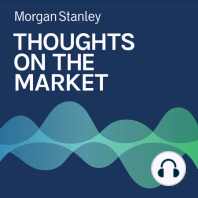3 min listen

Seth Carpenter: A Stark Choice for the European Central Bank
Seth Carpenter: A Stark Choice for the European Central Bank
ratings:
Length:
4 minutes
Released:
Jun 23, 2022
Format:
Podcast episode
Description
Inflation has continued to surprise to the upside, causing global central banks to face a difficult choice; continue to raise rates at the risk of recession, or settle in for a long spell of elevated inflation.-----Transcript-----Welcome to Thoughts on the Market. I'm Seth Carpenter, Morgan Stanley's Chief Global Economist. Along with my colleagues, bringing you a variety of perspectives. Today, I'll be talking about the key challenges for central banks and particularly the European Central Bank. It's Thursday, June 23rd, at 3:30 p.m. in New York. Just about all conversations these days involve high inflation and monetary policy tightening. It is tough all over. Central banks all have to make harder and harder choices as inflation keeps surprising to the upside. Take the Fed. They hiked 75 basis points at their last meeting. That was 25 basis points more than was priced in just a week before the meeting. At the June European Central Bank meeting, President Lagarde also weighed in. She was clear about a 25 basis point hike in July and that the rate hike in September would be larger, presumably 50 basis points if the outlook for medium term inflation is still above target. Putting that simply, if the ECB does not lower its forecast for inflation in 2024, we should expect a 50 basis point hike in September. A lower inflation forecast faces long odds. Headline inflation in Europe will be pushed around by commodity prices. Consider that European inflation is much more non-core, that is food and energy, than it is core inflation. And for core inflation, the ECB typically looks to economic growth as the key driver, but with about a one year lag. So their forecast for 2024 inflation is going to depend on their forecast for 2023 growth. And it's just very hard to see what data we are going to get by September that's going to meaningfully lower their forecast for 2023 growth. So now the ECB has joined the ranks of central banks that are hiking more and more with the goal of slowing inflation. But they have to face the dilemma that I wrote a few pieces about back in January. At that point, I was discussing the Fed, but the same choice is there and it is stark— either cause a recession and bring inflation down in the near term or engineer a substantial slowdown, but one that is shy of a recession, and accept elevated inflation for years to come. You see, despite the typical lags of policy, if the ECB chose to engineer a recession right now, those effects would almost surely show through to growth by 2023, pulling down inflation in 2024. So why are they making this choice? On the most simple level, no central banker really wants to cause a recession if they can avoid it. And remember that euro area inflation is now heavily driven by food and energy prices. Those noncore prices are only barely related to Euro area activity. It would take a severe recession in Europe to meaningfully drive down noncore prices. And finally, reports are swirling of a new tool to ward off fragmentation in European markets. If we get a hard crash of the economy, that by itself could precipitate the market fragmentation that they're trying to avoid. So what happens next? The Governing Council is on a hiking cycle, but they want a soft landing. The problem is that we are more pessimistic than they are about Euro Area growth starting as soon as the second half of this year. With inflation currently high and their commitment to tightening to fight that inflation, we might not get the clear signals of a slowdown in the economy before it's too late. The ECB might think it is choosing the more benign path but if our forecasts are right, the risks of them hiking into a recession, even inadvertently, are clearly rising. Thanks for listening. If you enjoy this show, please leave us a review on Apple Podcasts and share Thoughts on the Market with a friend or colleague today.
Released:
Jun 23, 2022
Format:
Podcast episode
Titles in the series (100)
Andrew Sheets: For Markets, Signs, Signs, Everywhere Signs by Thoughts on the Market